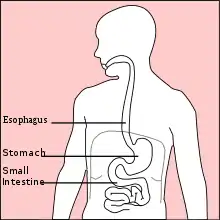< Spanish by Choice



.jpg.webp)


I Feel Sick
Introduction
It's never good when someone doesn't feel well but at least you can use the opportunity to start a small conversation in Spanish. The keywords are pobrecito – poor guy, and ¿Qué tienes? – What's wrong with you?
- related SpanishPod lessons: A0006: How's it going?, A0076: Jet-lag, A0116: Do you want a mint?
- discussion: visit the readers' forum for this lesson to discuss it or to ask questions about it
- source: SpanishPod, the original MP3 lesson content of this lesson is licensed by PraxisLanguage Ltd. under a Creative Commons 3.0 Unported license.
 |
 |
Audio Lesson

Dialogue
mujer: Hombre, ¿qué te pasa? align="right"| hombre: Me siento mal. align="right"| mujer: ¿Qué tienes? align="right"| hombre: Me duele el estómago. align="right"| mujer: Pobrecito. align="right"|

Dialogue with Translation
mujer: Hombre, ¿qué te pasa? align="right" valign="top" rowspan="3"| man what (to) you (it) happens woman: Hey, what's happening to you?
hombre: Me siento mal. align="right" valign="top" rowspan="3"| myself (I) feel badly man: I don't feel so good.
mujer: ¿Qué tienes? align="right" valign="top" rowspan="3"| what (you) have woman: What's wrong with you?
hombre: Me duele el estómago. align="right" valign="top" rowspan="3"| (to) me hurts the stomach man: My stomach hurts.
mujer: Pobrecito. align="right" valign="top" rowspan="3"| poor guy woman: Poor little dude.

el estómago – the stomach
.jpg.webp)
pobre – poor
Vocabulary for Dialogue
el hombre noun (masculine) the man la mujer noun (feminine) the woman ¿qué? interrogative pronoun what? te indirect object pronoun (to) you pasar verb (infinitive) to happen (él/ella) pasa verb (present tense) he/she(/it) happens se reflexive pronoun oneself sentirse verb (infinitive) to feel (oneself) me reflexive pronoun myself (yó) me siento verb (present tense) I feel (myself) mal adverb badly tener verb (infinitive) to have (tú) tienes verb (present tense) you have (informal, singular) me indirect object pronoun (to) me doler verb (infinitive) to hurt (él/ella) duele verb (present tense) he/she(/it) hurts el estómago noun (masculine) the stomach pobre adjective (m./f.) poor el pobrecito noun (masculine) the poor little guy
Vocabulary for Audio Lesson
gordo/gorda adjective (m./f.) fat el gordito noun (masculine) the chubby guy poco/poca adjective (m./f.) little el poquito noun (masculine) the little cute bit hasta luego phrase see you later

More Vocabulary
This section includes grammatically related words. Some of them are required by the exercise Dialogue Recast.
| me | indirect object pronoun | (to) me |
| te | (to) you (informal, singular) | |
| le | (to) him/her(/it) | |
| le | (to) you (formal, singular) | |
| nos | (to) us | |
| os | (to) you (informal, plural) | |
| les | (to) them | |
| les | (to) you (formal, plural) | |
| pasar | infinitive | to happen |
| (yo) paso | present tense | I happen |
| (tú) pasas | you happen (informal, singular) | |
| (él/ella) pasa | he/she(/it) happens | |
| (usted) pasa | you happen (formal, singular) | |
| (nosotros/-as) pasamos | we happen (m./f.) | |
| (vosotros/-as) pasáis | you happen (informal, plural, m./f.) | |
| (ellos/ellas) pasan | they happen (m./f.) | |
| (ustedes) pasan | you happen (formal, plural) | |
| me | reflexive pronoun | myself |
| te | yourself (informal, singular) | |
| se | himself/herself(/itself) | |
| se | yourself (formal, singular) | |
| nos | ourselves, each other | |
| os | yourselves, each other (informal, plural) | |
| se | themselves, each other | |
| se | yourselves, each other (formal, plural) | |
| sentirse | infinitive | to feel (oneself) |
| (yo) me siento | present tense | I feel (myself) |
| (tú) te sientes | you feel (yourself) (informal, singular) | |
| (él/ella) se siente | he/she(/it) feels (himself/herself/itself) | |
| (usted) se siente | you feel (yourself) (formal, singular) | |
| (nosotros/-as) nos sentimos | we feel (ourselves) (m./f.) | |
| (vosotros/-as) os sentís | you feel (yourselves) (informal, plural, m./f.) | |
| (ellos/ellas) se sienten | they feel (themselves) (m./f.) | |
| (ustedes) se sienten | you feel (yourselves) (formal, plural) | |
| tener | infinitive | to have |
| (yo) tengo | present tense | I have |
| (tú) tienes | you have (informal, singular) | |
| (él/ella) tiene | he/she(/it) has | |
| (usted) tiene | you have (formal, singular) | |
| (nosotros/-as) tenemos | we have (m./f.) | |
| (vosotros/-as) tenéis | you have (informal, plural, m./f.) | |
| (ellos/ellas) tienen | they have (m./f.) | |
| (ustedes) tienen | you have (formal, plural) | |
| doler | infinitive | to hurt |
| (yo) duelo | present tense | I hurt |
| (tú) dueles | you hurt (informal, singular) | |
| (él/ella) duele | he/she(/it) hurts | |
| (usted) duele | you have (formal, singular) | |
| (nosotros/-as) dolemos | we hurt (m./f.) | |
| (vosotros/-as) doléis | you hurt (informal, plural, m./f.) | |
| (ellos/ellas) duelen | they hurt (m./f.) | |
| (ustedes) duelen | you hurt (formal, plural) | |

Exercises
Dialogue Translation
Translate from Spanish to English. Click each bar to check your answer. If possible, read the Spanish sentences aloud.
Hombre, ¿qué te pasa?
Hey, what's happening to you?
Me siento mal.
I don't feel so good.
¿Qué tienes?
What's wrong with you?
Me duele el estómago.
My stomach hurts.
Pobrecito.
Poor little dude.
Dialogue Recall
Now translate from English to Spanish. Remember to say the Spanish sentences aloud.
Man, what's happening to you?
Hombre, ¿qué te pasa?
I don't feel so good.
Me siento mal.
What's wrong with you?
¿Qué tienes?
My stomach hurts.
Me duele el estómago.
Poor guy.
Pobrecito.
Dialogue Remix
Translate this variant of the dialogue from English to Spanish.
Hey!
¡Hombre!
What's up? (= What happens?)
¿Qué pasa?
I feel very (= muy) bad.
Me siento muy mal.
What's your problem?
¿Qué tienes?
I have a headache. (= The head (= la cabeza) hurts to me.)
Me duele la cabeza.
I feel sorry. (= It (= lo) I feel.)
Lo siento.
Dialogue Recast
This translation exercise requires some of the words from the More Vocabulary section.
What's happening to you? (formal, plural)
¿Qué les pasa?
We don't feel so good.
Nos sentimos mal.
What's wrong with you? (formal, plural)
¿Qué tienen (ustedes)?
My stomach hurts.
Me duele el estómago.
Poor little guy.
Pobrecito.
| ← previous: lesson A0015 | ↑ current: lesson A0016 | ↑↑ index: SpanishPod lessons | next: lesson A0019 → |
This article is issued from Wikibooks. The text is licensed under Creative Commons - Attribution - Sharealike. Additional terms may apply for the media files.